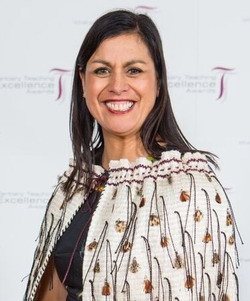HRC Board Chair and Māori Health Committee Chair Associate Professor Suzanne Pitama has won the Prime Minister's Supreme Award for tertiary teaching excellence.
Associate Professor Suzanne Pitama, who is Director of the Māori/Indigenous Health Institute (MIHI) at the University of Otago, Christchurch, receives $10,000 through the Supreme Award.
The Supreme Award is considered the ultimate prize of the national Tertiary Teaching Excellence Awards, held annually at Parliament. As the 2015 recipient, the Prime Minister’s Supreme Award recognises Associate Professor Pitama’s unstinting commitment to tertiary learners and the broader community spanning a 14-year teaching career.
The awards celebrate New Zealand’s finest tertiary teachers as recognised by their organisations, colleagues, learners, and broader communities.
Suzanne Pitama—an innovator and a leader
Associate Professor Suzanne Pitama has worked tirelessly towards improving health in Māori communities with a commitment to redressing the inequity between Māori and non-Māori on issues relating to illness. Her teaching is student-centred; striving to educate medical students to work alongside Māori patients, whānau and communities in ways that support best clinical practice and reduce Māori health inequities. An international colleague describes her teaching programme as “the most comprehensive indigenous health curricula (in medicine) in Australia and New Zealand”.
In 2010, she developed two Māori models of health, The Hui Process and The Meihana Model; both of which directly connect Te Ao Māori (the Māori World) with clinical practice. The Hui Process teaches students how to engage with a Māori patient and their whānau, interweaving clinical practice throughout each stage. The Meihana Model helps students to complete the Kaupapa component of the clinical interaction/assessment so they achieve both clinical and cultural integration in their practice.
These models have now been integrated into the Māori health curriculum across the University of Otago’s three clinical schools, medical schools at other tertiary institutions, government departments, and a broader range of health providers.
Information courtesy of the University of Otago, Christchurch
